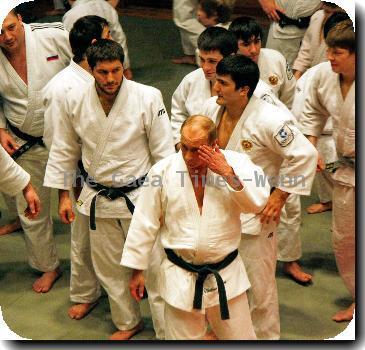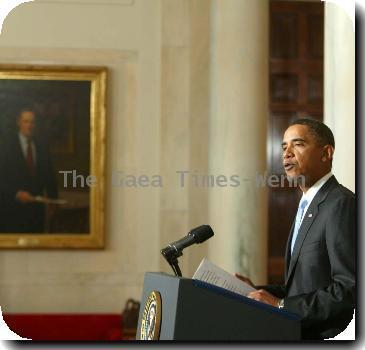Polish president, wife, dignitaries and dozens of others die in Russian plane crash
By Jim Heintz, APSaturday, April 10, 2010
Polish leader, dozens dead in Russia jet crash
MOSCOW — Polish President Lech Kaczynski and some of the country’s highest military and civilian leaders died Saturday along with dozens of others when the presidential plane crashed as it came in for a landing in thick fog in western Russia.
Russian and Polish officials offered conflicting death tolls but agreed there were no survivors on the Soviet-era Tupolev, which was taking the president, his wife and staff to events marking the 70th anniversary of the massacre of thousands of Polish officers by Soviet secret police.
The Army chief of staff, Gen. Franciszek Gagor, National Bank President Slawomir Skrzypek and Deputy Foreign Minister Andrzej Kremer were also on board, the Polish foreign ministry said.
The head of Russia’s top investigative body, Sergei Markin, said there 132 people on the Tu-154. Poland’s Foreign Ministry spokesman, Piotr Paszkowski, said there were 89 people on the passenger list but one person had not shown up.
“We still cannot fully understand the scope of this tragedy and what it means for us in the future. Nothing like this has ever happened in Poland,” Paszkowski said. “We can assume with great certainty that all persons on board have been killed.”
The governor of the Smolensk region, where the crash took place about 11 a.m. (0700 GMT), also said no one survived.
State news channel Rossiya-24 showed footage from the crash site, with pieces of the plane scattered widely amid leafless trees and small fires burning in woods shrouded with fog. A tail fin with the Polish red and white colors stuck up from the debris.
“The Polish presidential plane did not make it to the runway while landing. Tentative findings indicate that it hit the treetops and fell apart,” Sergei Anufriev said on Rossiya-24. “Nobody has survived the disaster.”
The presidential Tu-154 was at least 20 years old. Polish officials have long discussed replacing the planes that carry the country’s leaders but said they lacked the funds. According to the Aviation Safety Network, there have been 66 crashes involving Tu-154s, including six in the past five years. The Russian carrier Aeroflot recently withdrew its Tu-154 fleet from service.
The crash is likely to be a setback in Polish-Russian relations, which had been improving of late after being poisoned for decades over the Katyn massacre.
Russia never has formally apologized for the murders of some 22,000 Polish officers, but Prime Minister Vladimir Putin’s decision to attend a memorial ceremony earlier this week in the forest near Katyn was seen as a gesture of goodwill toward reconciliation. Rossiya-24 showed hundreds of people around the Katyn monument, many holding Polish flags, some weeping.
In Warsaw, Prime Minister Donald Tusk called an extraordinary meeting of his Cabinet and the national flag was lowered to half-staff at the presidential palace, where people gathered to lay flowers and light candles.
Black ribbons appeared in some windows in the Polish capital.
Poland’s president is commander-in-chief of its armed forces but the position’s domestic duties are chiefly symbolic. Kaczynski, 60, became president in December 2005 after defeating Tusk in that year’s presidential vote.
The nationalist conservative was the twin brother of Poland’s opposition leader, former Prime Minister Jaroslaw Kaczynski. Kaczynski’s wife, Maria, was an economist. They had a daughter, Marta, and two granddaughters.
Kaczynski had said he would seek a second term in presidential elections this fall. He was expected to face an uphill struggle against Parliament speaker Bronislaw Komorowski, the candidate of Tusk’s governing Civic Platform party.
According to the constitution, Komorowski would take over presidential duties.
Poland, a nation of 38 million people, is by far the largest of the 10 formerly communist countries that have joined the European Union in recent years.
Last year, Poland was the only EU nation to avoid recession and posted economic growth of 1.7 percent.
It has become a firm U.S. ally in the region since the fall of communism — a stance that crosses party lines.
The country sent troops to the U.S.-led war in Iraq and recently boosted its contingent in Afghanistan to some 2,600 soldiers.
U.S. Patriot missiles are expected to be deployed in Poland this year. That was a Polish condition for a 2008 deal — backed by both Kaczynski and Tusk — to host long-range missile defense interceptors.
The deal, which was struck by the Bush administration, angered Russia and was later reconfigured under President Barack Obama’s administration.
Under the Obama plan, Poland would host a different type of missile defense interceptors as part of a more mobile system and at a later date, probably not until 2018.
Kaczynski is the first serving Polish leader to die since exiled World War II-era leader Gen. Wladyslaw Sikorski in a plane crash off Gibraltar in 1943.
U.S. State Department spokesman P.J. Crowley said Saturday, “This is a horrible tragedy for Poland and we extend to the people of Poland our deepest condolences.”
Neighboring Germany’s foreign minister, Guido Westerwelle, said he was “shocked and full of sadness” at Kaczynski’s death.
“All the German people are mourning with our Polish neighbors,” Westerwelle said during a visit to South Africa.
_____
Associated Press Writers Mansur Mirovalev in Moscow, Monika Scislowska in Warsaw, Geir Moulson in Berlin, Deborah Seward in Paris and Naomi Koppel in London contributed to this report.
Tags: Accidents, Barack Obama, Eastern Europe, Europe, Lech Kaczynski, Moscow, North America, Poland, Polish president, Russia, Smolensk, Transportation, United States, Vladimir Putin





